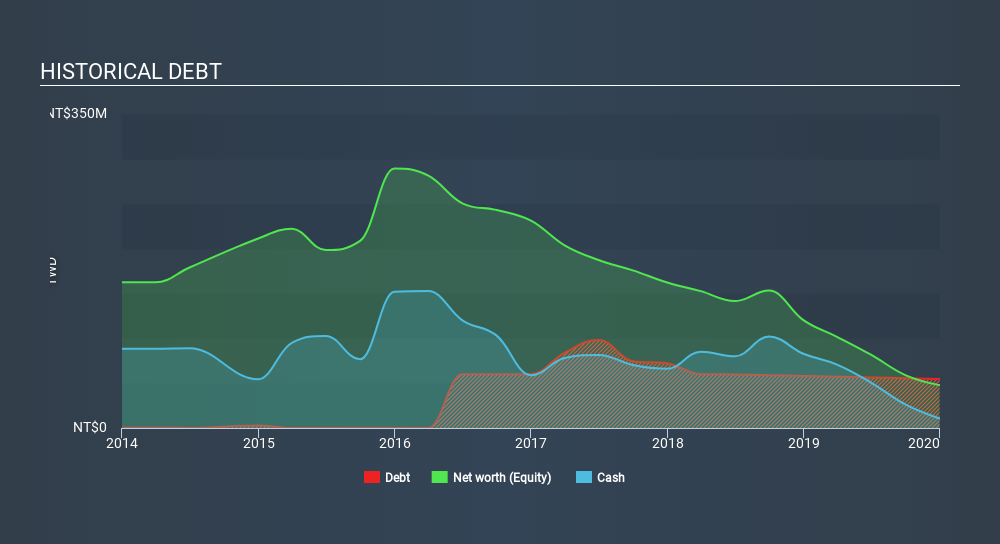Some say volatility, rather than debt, is the best way to think about risk as an investor, but Warren Buffett famously said that 'Volatility is far from synonymous with risk'. It's only natural to consider a company's balance sheet when you examine how risky it is, since debt is often involved when a business collapses. We can see that Mr. Onion International Co., Ltd (GTSM:2740) does use debt in its business. But is this debt a concern to shareholders?
When Is Debt A Problem?
Debt is a tool to help businesses grow, but if a business is incapable of paying off its lenders, then it exists at their mercy. If things get really bad, the lenders can take control of the business. However, a more usual (but still expensive) situation is where a company must dilute shareholders at a cheap share price simply to get debt under control. By replacing dilution, though, debt can be an extremely good tool for businesses that need capital to invest in growth at high rates of return. When we think about a company's use of debt, we first look at cash and debt together.
View our latest analysis for Mr. Onion International
How Much Debt Does Mr. Onion International Carry?
As you can see below, Mr. Onion International had NT$54.7m of debt at December 2019, down from NT$58.1m a year prior. On the flip side, it has NT$10.6m in cash leading to net debt of about NT$44.1m.

How Healthy Is Mr. Onion International's Balance Sheet?
Zooming in on the latest balance sheet data, we can see that Mr. Onion International had liabilities of NT$57.2m due within 12 months and liabilities of NT$82.4m due beyond that. On the other hand, it had cash of NT$10.6m and NT$9.41m worth of receivables due within a year. So its liabilities outweigh the sum of its cash and (near-term) receivables by NT$119.6m.
This deficit is considerable relative to its market capitalization of NT$124.6m, so it does suggest shareholders should keep an eye on Mr. Onion International's use of debt. This suggests shareholders would be heavily diluted if the company needed to shore up its balance sheet in a hurry. When analysing debt levels, the balance sheet is the obvious place to start. But it is Mr. Onion International's earnings that will influence how the balance sheet holds up in the future. So when considering debt, it's definitely worth looking at the earnings trend. Click here for an interactive snapshot.
In the last year Mr. Onion International had negative earnings before interest and tax, and actually shrunk its revenue by 48%, to NT$171m. To be frank that doesn't bode well.
Caveat Emptor
While Mr. Onion International's falling revenue is about as heartwarming as a wet blanket, arguably its earnings before interest and tax (EBIT) loss is even less appealing. Its EBIT loss was a whopping NT$77m. Considering that alongside the liabilities mentioned above does not give us much confidence that company should be using so much debt. Quite frankly we think the balance sheet is far from match-fit, although it could be improved with time. However, it doesn't help that it burned through NT$49m of cash over the last year. So in short it's a really risky stock. The balance sheet is clearly the area to focus on when you are analysing debt. However, not all investment risk resides within the balance sheet - far from it. Like risks, for instance. Every company has them, and we've spotted 6 warning signs for Mr. Onion International (of which 3 are a bit concerning!) you should know about.
When all is said and done, sometimes its easier to focus on companies that don't even need debt. Readers can access a list of growth stocks with zero net debt 100% free, right now.
If you spot an error that warrants correction, please contact the editor at editorial-team@simplywallst.com. This article by Simply Wall St is general in nature. It does not constitute a recommendation to buy or sell any stock, and does not take account of your objectives, or your financial situation. Simply Wall St has no position in the stocks mentioned.
We aim to bring you long-term focused research analysis driven by fundamental data. Note that our analysis may not factor in the latest price-sensitive company announcements or qualitative material. Thank you for reading.
About TPEX:2740
Flawless balance sheet with low risk.
Market Insights
Community Narratives



